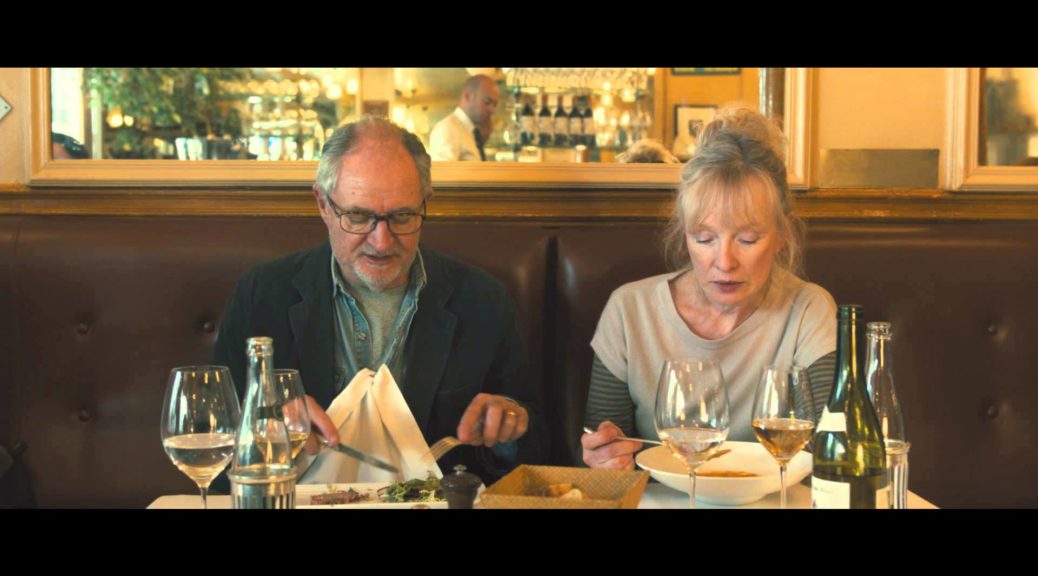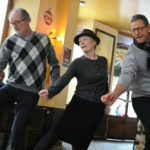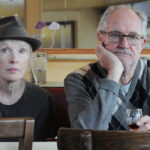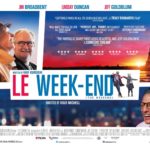There’s a world of difference between romcoms, churned out by the thousand in Hollywood and beyond, and wry comedies exploring the bittersweet boundaries and existential possibilities of love. Assuming that to be a continuum between the naff and the wise, all films in this space succeed to a greater or lesser degree in achieving moments worthy of the latter category, but seldom if ever sustain for the full 90+ minutes.
Actually, that’s a simplistic analysis, since a few succeed as comedies but fail to nail the nature of love (I Give It A Year for vulgarity but genuine comedy, lots more than don’t even do that), while I can think of a fair number that deliver on love to magnificent effect without actually giving the audience a titter, other than from the familiarity of the scenarios.
For example, 45 years and Amour fit that bill, and both just happen to be about couples at the rump end of life. Both are stunning dramas in their own right, all the better for being beautifully observed, painfully honest, cast with genius and precision, and played as if the couples in question had lived together for 50 years in preparation for the movie. You simply cannot do this well without true character actors, people you can believe have been together forever.
I mention this because I expected Roger Michell‘s Le Week-End to be more of a tries-too-hard-but fails-miserably-despite-the-cast romcom, when in fact it is far closer to the latter category – a nuanced drama picking apart the strands of a marriage where both parties have drifted for decades, yet somehow can’t bring themselves to part.
It works because the marriage dynamic between failed lecturer Nick Burrows (the mercurial Jim Broadbent) and his bored teacher wife Meg (Lindsay Duncan) is credible. No, more than credible, is familiar yet undiscovered. But then they are quality actors who are always brilliant – you simply expect nothing less.
They are in Paris to rejuvenate their marriage after 30 years, but this is not a resolutely upbeat drama with a twee happy ending (well, after a fashion.) Its subjects are, not to put too fine a point on it, skint. They find themselves facing the middle class indignity of having to trick their way out of a restaurant without paying, and are thrown out of their hotel for presenting a dud card and having no other means of settling their bill. Shameless!
How come they are in this predicament? Nick has lost his job for allegedly making an inappropriate remark to a female student, while she fancies early retirement. The pair go through a spectrum of emotions from ennui to love to lust to hate and back again. They bicker constantly yet there is some undying flame, somewhere, but you have to look very hard to find it.
Paris, meanwhile, is a bit-part player, a backdrop that looks ravishing and is always present, without invading the space occupied by the drama within. It is, you might say, seen but not really heard with its full voice – unlike other films where the terroir is less muted. For example, can you imagine Trainspotting without Edinburgh? You would have a different ambience if you transported Le Week-End elsewhere, but no less of a drama.
The principal arc of the film concerns one chance meeting. The intervention of successful writer and university friend of Nick, Morgan (Jeff Goldblum), impacts the dynamic in unpredictable ways, some of them positive. Nick is embarrassed by Morgan’s constant flannel, to the extent that he responds to a toast in his honour at a dinner party with the full story of his abject failure in life. Ironically enough, this brings Meg closer to him, perhaps a reminder of his vulnerability and need for companionship in a crisis.
Which brings me to scripts. No point employing the most deadly guns in town if you’re not going to give them the bullets to fire. No doubt about it, Hanif Kureishi spells quality screenwriting, lush and sparky speeches that trip off the tongues of Broadbent, Duncan and Goldblum. This film would be little more than a soapy melodrama set against Paris were it not for Kureishi’s delicious words.
I love the exchanges between Duncan and Broadbent, mostly because they lure you into the world of the characters without ever, for one moment, becoming a tit-for-tat rowing match or stereophonic droning. The dialogue is, as with all the greatest scripts, multi-dimensional.
The film ends on an upbeat note: dancing in a cafe to music on the jukebox, a fleeting moment before the inevitable looming disasters in the Burrows household. What follows? Repossession, bankruptcy, maybe worse – yet you get the impression that they will stick through the thin, much as they did the thick. For better or worse, as the vows put it.
I can’t promise this to be the greatest movie you’ll ever see, but as minor ones go it is certainly worth a visit. A tiny gem with a ray of sunlight. Hoorah!













